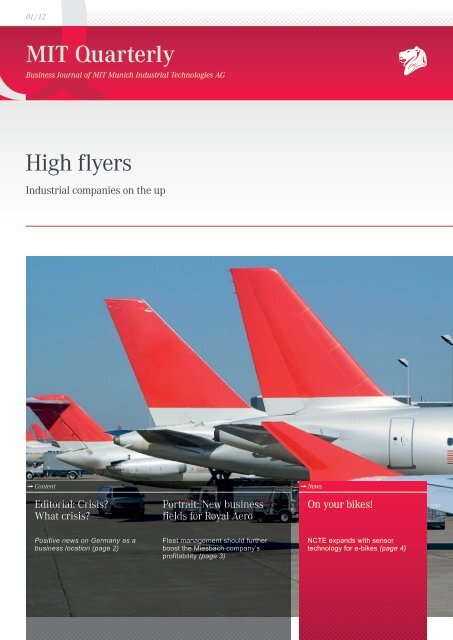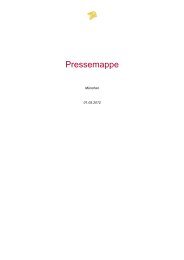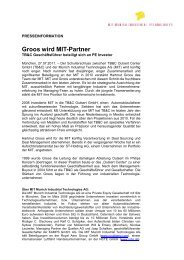High flyers MIT Quarterly - MIT Munich Industrial Technologies AG
High flyers MIT Quarterly - MIT Munich Industrial Technologies AG
High flyers MIT Quarterly - MIT Munich Industrial Technologies AG
You also want an ePaper? Increase the reach of your titles
YUMPU automatically turns print PDFs into web optimized ePapers that Google loves.
01/12<br />
<strong>MIT</strong> <strong>Quarterly</strong><br />
Business Journal of <strong>MIT</strong> <strong>Munich</strong> <strong>Industrial</strong> <strong>Technologies</strong> <strong>AG</strong><br />
<strong>High</strong> <strong>flyers</strong><br />
<strong>Industrial</strong> companies on the up<br />
Content News<br />
Editorial: Crisis?<br />
What crisis?<br />
Positive news on Germany as a<br />
business location (page 2)<br />
Portrait: New business<br />
fields for Royal Aero<br />
Fleet management should further<br />
boost the Miesbach company’s<br />
profitability (page 3)<br />
On your bikes!<br />
NCTE expands with sensor<br />
technology for e-bikes (page 4)
2<br />
Editorial<br />
Crisis? What crisis?<br />
We are assailed almost daily by dire reports about the global economic crisis and its impact.<br />
However, the German automotive industry is more successful than ever before.<br />
6,000,000<br />
5,000,000<br />
4,000,000<br />
It’s just incredible: wherever you look there’s a crisis. The world is speculating about<br />
the euro crisis and Greece’s debts, Der Spiegel has dubbed China a limping giant,<br />
and the USA is still struggling to get to grips with its record national debt.<br />
In short, if the newspapers are to be believed, things are looking far from rosy. But<br />
there’s another side to the story – the economic one, which should be represented<br />
not by some arbitrary industry but by the most important one. In a 2009 study on the<br />
Importance of the car industry for the German economy in the European context, the<br />
Center for European Economic Research stressed that “carmaking is thriving within<br />
the German manufacturing sector. Viewed in absolute categories, it leads the pack<br />
in employment, added value, investments, exports/imports, direct investments and<br />
innovative activities such as research and development.”<br />
Business News<br />
Car production in Germany<br />
5.1 Mio.<br />
2002<br />
5.1 Mio.<br />
2003<br />
5.2 Mio.<br />
2004<br />
“If leading German newspapers continue to talk<br />
of a major crisis, they will eventually conjure up<br />
a real one.“<br />
5.4 Mio.<br />
2005<br />
5.4 Mio.<br />
2006<br />
5.7 Mio.<br />
2007<br />
5.5 Mio.<br />
2008<br />
5.0 Mio.<br />
2009<br />
5.6 Mio.<br />
2010<br />
Photo left: Rüdiger C. Olschowy,<br />
Managing Director of <strong>MIT</strong><br />
Photo right: Ralf G. Schöpker,<br />
Managing Director of <strong>MIT</strong><br />
5.9 Mio.<br />
2011<br />
In concrete terms, this means that “7.7<br />
percent of total added value in Germany<br />
is created by the automotive industry,<br />
of which 4.9 percent is accounted for<br />
by indirect effects. The industry’s total<br />
contribution to added value in Germany<br />
is thus almost twice that in the next<br />
best-performing European countries and<br />
Japan. […]”<br />
If you look at car manufacturing and the<br />
sectors that are dependent on it – from<br />
the steel industry to plant and machinery<br />
construction – the surprising conclusion<br />
is that there is no crisis and that in fact<br />
we are on an economic roll that puts<br />
everything that has gone before in the<br />
shade. This is the case not just for major<br />
corporations but also for a large percentage<br />
of German SMEs. Thus, all German<br />
car manufacturers in 2011 achieved historically<br />
unparalleled results. Porsche,<br />
for instance, is selling more cars than<br />
ever before and sees 2011 as one of the<br />
most successful years in the company’s<br />
history. VW has set an absolute record<br />
with over eight million vehicles sold in<br />
2011. And the BMW Group also ended<br />
the 2011 financial year with the best results<br />
in its history. It is hardly surprising<br />
then that in 2011 Germany’s GDP rose<br />
by 3 percent on the previous year.<br />
This clearly shows that while we in<br />
Germany wallow in glum newspaper<br />
articles about crises and catastrophes,<br />
our industrial companies are earning<br />
handsomely.<br />
At least at the moment – because media<br />
coverage that continues to harp on about<br />
the collapse of Europe will gradually<br />
create economic uncertainty and all<br />
that goes with it. Carmakers are still announcing<br />
robust sales figures to their<br />
suppliers, and suppliers should now be<br />
investing in order to supply the projected<br />
volumes in the mid-term. But if leading<br />
German newspapers continue to talk of a<br />
major crisis, they will eventually conjure<br />
up a real one.<br />
The average unemployment rate in 2011<br />
was 7.1 percent, the lowest since 1981,<br />
and the downward trend is continuing.<br />
Unemployment in January was 7.9 percent<br />
lower than in the same month of<br />
the previous year. It is now high time<br />
that the media recognizes the signs of<br />
the times and starts reporting something<br />
positive about Germany as a business<br />
location again.<br />
<strong>MIT</strong> <strong>Quarterly</strong> 01/12
Portrait<br />
New business fields for Royal Aero<br />
The company plans to grow through the development of its Technology and Leasing divisions, consolidation of its three business<br />
fields in Royal Aero GmbH and expansion of its service portfolio<br />
Royal Aero offers its customers comprehensive services – from complete life-cycle management to the financing<br />
of aircraft components<br />
Safety is probably the most crucial criterion that an aircraft must meet so that passengers<br />
feel confident while flying. Planes and trains are indeed the safest modes of<br />
transport overall thanks to regulations that specify, for instance, how long engines and<br />
other aviation components are allowed to be kept in service.<br />
Royal Aero steps in at the latest when an engine has reached the end of its life cycle.<br />
The company specializes in the sourcing, processing and sale of high-quality parts for<br />
the aeronautic industry, especially assemblies and replacement parts for the turbine<br />
engines installed in modern wide-bodied aircraft. This enables Royal Aero to supply<br />
its customers with original replacement parts that meet the very highest quality standards<br />
and are also available quickly and cost-efficiently.<br />
Although this business field is profitable, growing competition means that it is becoming<br />
increasingly less attractive for Royal Aero, which relies on strong growth.<br />
The company is therefore now concentrating on expanding its other two divisions:<br />
Technical and Leasing.<br />
The Technical Division advises and supports customers in all matters relating to the<br />
maintenance and repair of engines throughout their life cycle. The engine specialists<br />
at Royal Aero ensure, for example, that the turbines they service are overhauled on<br />
schedule to minimize downtime and maximize cost-efficiency.<br />
Royal Aero’s Leasing Division leases turbines to airlines. Leasing offers the advantage<br />
that the airline retains more liquidity than would be the case if it had to<br />
purchase the turbines outright. Because capital is not tied up in the long term, they<br />
are able to adapt flexibly to changing market conditions.<br />
To bundle its services and products efficiently and simplify dealings with customers,<br />
Royal Aero merged its three business units Royal Aero Services GmbH, Royal Aero<br />
Leasing GmbH and Royal Aero Technical GmbH into a single company, Royal Aero<br />
GmbH, at the beginning of 2012. For customers who draw on services from several<br />
divisions, the advantage is that they now have just one contact and can access all<br />
the services and products quickly and easily. The resulting interactions and closer<br />
cooperation between departments should further boost the company’s profitability.<br />
Apart from the reorganization, Royal Aero<br />
has also decided to expand its service<br />
portfolio in order to consolidate its strong<br />
position on the market.<br />
Thanks to its extensive technical and<br />
commercial expertise, the Miesbachbased<br />
company advises airlines on the<br />
purchase of engines and aircraft. For example,<br />
Royal Aero recently advised Cebu<br />
Pacific about the purchase of engines<br />
for its Airbus fleet and offers the same<br />
service to other airlines. Because Royal<br />
Aero does not work on behalf of a single<br />
manufacturer, the Miesbach specialists<br />
are able to advise their customers independently<br />
across all makes and models.<br />
Royal Aero is developing into a serviceoriented<br />
company in other areas as well.<br />
“We cover the entire life - cycle management<br />
of aviation components. At the<br />
same time we offer suitable financial<br />
solutions,” explains Calum MacLeod,<br />
Royal Aero’s founder and managing<br />
director. “In this way we should be able<br />
to continue the strong growth and high<br />
profitability of recent years.”<br />
<strong>MIT</strong> <strong>AG</strong> has had an indirect stake in Royal<br />
Aero Group GmbH through its Gulf One<br />
BIT Fund since 2007. “We are delighted<br />
by Royal Aero’s performance,” confirms<br />
Martin Dötterl, investment manager and<br />
partner at <strong>MIT</strong> and member of Royal<br />
Aero’s Advisory Board.<br />
Aircraft turbines: the core business of Royal Aero<br />
<strong>MIT</strong> <strong>Quarterly</strong> 01/12 3
4<br />
News<br />
New <strong>MIT</strong> team member<br />
Martin Dötterl is a new investment<br />
manager and partner<br />
The new face at <strong>MIT</strong>: Martin Dötterl<br />
Martin Dötterl, who has a masters degree<br />
in business administration, joined the<br />
<strong>Munich</strong> <strong>Industrial</strong> <strong>Technologies</strong> team as<br />
an investment manager and partner in<br />
June 2011. He is an ideal addition to <strong>MIT</strong><br />
thanks to his experience as an accountant<br />
and management consultant.<br />
Before moving to <strong>MIT</strong>, Martin Dötterl<br />
worked for six years in the Transaction<br />
Advisory Services Department of the<br />
accountancy firm Ernst & Young in <strong>Munich</strong>,<br />
where he advised national and international<br />
industrial and private equity companies.<br />
During his time at Ernst & Young<br />
he successfully completed his professional<br />
examinations as a tax consultant<br />
and public accountant.<br />
His duties include supporting the development<br />
of Happy Plating. Martin Dötterl is<br />
also on the Advisory Board of Royal Aero.<br />
Publishing details<br />
Edition:<br />
Published quarterly<br />
Next edition:<br />
June 2012<br />
Published by:<br />
<strong>MIT</strong> <strong>Munich</strong> <strong>Industrial</strong> <strong>Technologies</strong> <strong>AG</strong><br />
Rüdiger C. Olschowy<br />
Grünwalder Weg 13 a · 82008 Unterhaching<br />
www.mit.ag<br />
On your bikes!<br />
NCTE expands with sensor technology for e-bikes<br />
In e-bikes and pedelecs a torque sensor integrated in the bottom bracket measures rotational speed, rotational<br />
direction and torque. With the help of these data the sensor can then calculate how hard the rider is pedaling and<br />
how much power the motor has to deliver.<br />
Some people may still remember Theo<br />
de Rooij as a bicycle racer or as the manager<br />
of the Radobank cycling team.<br />
Today the Dutchman is first and foremost<br />
a highly successful entrepreneur who set<br />
up TDR, a company that manufactures<br />
e-bikes and pedelecs. At Eurobike 2011<br />
he introduced the TDR FluxX pedelec,<br />
whose motor is integrated into the seat<br />
tube and the bottom bracket. De Rooij’s<br />
bike immediately won a Eurobike award.<br />
NCTEngineering GmbH has played a<br />
key role in the success story of TDR. It<br />
supplies the company with noncontact<br />
torque sensors, which TDR then fits to<br />
the gear axles of its electric bikes. The<br />
sensors measure how much energy the<br />
motor must deliver to maintain the cyclist’s<br />
pedaling force at a constant level.<br />
NCTE now has a new client in TDR, which<br />
is well on the way to establishing itself in<br />
a growing market. The company will introduce<br />
its first bicycles on the market in<br />
Design /editing:<br />
Compass Communications GmbH<br />
Dr. Perry Reisewitz<br />
Theresienstrasse 12 · 82319 Starnberg<br />
www.compass-communications.de<br />
Graphic Design /layout:<br />
Annette Fischer · visualign<br />
Schmellerstrasse 21 · 80337 <strong>Munich</strong><br />
www.visualign.de<br />
Printed by:<br />
Offsetdruck Schwarz<br />
Rohrauerstrasse 70 · 81477 <strong>Munich</strong><br />
March. Initially 200 retailers in Holland,<br />
Belgium and Switzerland will be supplied<br />
with models for their showrooms. Next<br />
year TDR aims to sell 1,500 e-bikes and<br />
pedelecs. By then the electric bikes will<br />
also be available in Germany. The company<br />
plans to sell 5,000 bikes in 2014.<br />
NCTE supplies other renowned clients<br />
apart from TDR. Hence, the sales figures<br />
for torque sensors are rising steadily.<br />
15,000 units were produced after production<br />
of sensors for the e-bike sector<br />
was ramped up last year. The company<br />
plans to deliver some 60,000 sensors in<br />
2012. By 2015 NCTE expects the company<br />
to sell up to 400,000 units – provided<br />
that the e-bike market develops in line<br />
with manufacturers’ forecasts.<br />
Thus, plans to develop NCTE into an<br />
industrial company have paid off. The<br />
company’s entry into large-scale production<br />
for various major manufacturers has<br />
enabled the NCTE team to produce significant<br />
volumes of torque sensors.<br />
One of the success factors of NCTE<br />
GmbH in Unterhaching is undoubtedly the<br />
stake in the company held by <strong>MIT</strong> <strong>Munich</strong><br />
<strong>Industrial</strong> <strong>Technologies</strong> <strong>AG</strong> through the<br />
Gulf One BIT and Gulf One <strong>MIT</strong> funds.<br />
Following the company’s establishment<br />
in 2004 and <strong>MIT</strong>’s investment in it in<br />
2007, NCTE achieved a profit for the first<br />
time in 2010.<br />
Since the forecasts are good, <strong>MIT</strong> is not<br />
contemplating selling the company just<br />
yet. At present, nothing stands in the way<br />
of further exponential growth at NCTE<br />
and not just with its e-bike sensors.<br />
<strong>MIT</strong> <strong>Quarterly</strong> 01/12






